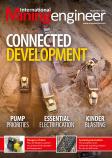Sophisticated water clarifiers and specially formulated polymer flocculants can eliminate the need for settling ponds at mines and aggregate plants by providing clarified water and easy-to-handle solids.
For mines and quarries that process dimensional stone, gold, crushed rock, sand or aggregate, washing these materials is a crucial step towards supplying clean, high-quality products. A common practice in these operations, washing removes impurities such as clay, silt, and organic matter. The dirty wash water is then processed to separate the solids from the water, which can then be re-used.
Traditionally, settling ponds have been used to separate suspended solids from the wash water, but this practice is being replaced by more effective water treatment and reclamation systems. Settling ponds not only lose water, which must be replaced, but also require significant clean up and maintenance. The separation of the solids from the water can be poor and the separated material ends up as ‘soupy’ pond sludge that is difficult to deal with.
Fortunately, advanced water clarification technology is resolving many of these issues. The technology is poised to make settling ponds obsolete by effectively and economically providing a continuous supply of clarified water as well as thick, easy-to-handle solids with minimal maintenance and labour.
“Modern clarifiers can separate water and solids at a high rate, in a closed-loop, automated process. The process is even more efficient when using properly specified and prepared polymers. The combined result is continuously clean water and manageable solids,” says Shane Schmutzler, president of Jadair International, a provider of water clarification systems and polymer systems for the mining industry.
Traditional Limitations
Settling ponds, widely used to collect the wastewater from washing mined materials, allow suspended solids and fine sediments to settle to the bottom over time. The clarified water is then either recycled for re-use in the wash process or discharged, depending on local regulations.
However, settling ponds have serious limitations. They can sometimes ‘run out’ of clean water, interrupting the plant’s washing process. They also require substantial ongoing maintenance, including cleaning and liner repairs. Draglines, excavators and haul trucks are used to dig out the ponds, but the process is tedious and costly. Excavating wet ‘soupy’ sludge is slow and makes a mess of the area and the equipment. Operator time is expensive, and the wear and tear on equipment can be significant. Severe weather can also cause substantial damage to ponds and require additional cleanup.
Ponds also require large amounts of makeup water when it evaporates or seeps into the ground. The cost to replace makeup water, which is often purchased from a local utility or pumped from wells, can add up quickly.
Real estate is another consideration. For many operators, settling ponds can use up a significant amount of space that could otherwise be put to better use or sold off.
Advanced Water Clarification
As an alternative to conventional settling ponds, innovative options such as the Settler/Clarifier system from Jadair International are now available to provide a continuous supply of clarified water with thick, drier solids.
With the Settler/Clarifier system, a specialised, non-toxic polymer is injected into the water stream before it enters the machine. The polymer promotes flocculation, a process that causes small particles to clump together into larger particles called flocs, which settle at the bottom and leave clarified water above. The clarified water is then discharged into a receiving tank for re-use.
The solids are removed from the machine and accumulate in front of the system – they can be easily moved by a loader or belt conveyor. The system then separates the suspended solids and brings them out in a thickened form that does not require secondary processing.
“Discharged solids can be easily scooped up by loaders and stacked for further drying or sale to companies such as those involved with landscaping, landfill, or soil remineralisation. What was once a waste product can become a saleable product,” says Schmutzler.
The Settler/Clarifier system can recycle thousands of gallons of water per minute and is a closed loop. The water and solids are separated inside the system so the clarified water can be fully re-used in the wash process. Dirty water goes in one end and clarified water comes out the other. The system can handle a wide range of solids, from course material to the smallest silts or clays and does not require any ponds or secondary processing.
“The system recycles wash water and reduces the need for makeup water. This conserves resources, saves money, and protects the environment,” says Schmutzler.
Once set up for a plant’s operation, the system requires very little operator supervision.
“The process is essentially automated, which allows for minimal operator interaction. This allows the customer to do their job while the machine does its job,” Schmutzler says. “The system also requires very little maintenance and, there is no pond sludge to deal with.”
He notes that the system can be installed on a permanent or temporary basis and easily moved.
To determine the best polymer for each site, Jadair provides water testing and evaluation services to help to ensure optimum water clarification and system performance. The company works directly with multiple polymer manufacturers to find the best product for each plant’s application. Ultimately, a polymer tailored to the plant’s process will yield the best results, producing cleaner water along with higher quality solids and final product.
In addition to Settler/Clarifier units with integrated polymer systems, the company also provides stand-alone polymer systems that can be used with existing settling ponds or other equipment to help keep the water cleaner and make settled solids easier to handle. At plants that already use polymers in their process, the use of Jadair polymers and systems often reduces the amount of polymer used, thereby saving their customers money.
“Selecting the correct polymer, ensuring its proper preparation, and optimising its reaction all make a significant difference to its effectiveness. This meticulous approach can help plants use less polymer, achieve superior liquid/solids separation, and get cleaner, higher quality water,” says Schmutzler, adding that customers have reported up to a 50% reduction in the amount of polymer used over previous levels.
Settling ponds have long been the accepted method of handling dirty wash water. However, mining professionals that take advantage of innovative clarification systems can improve productivity by ensuring an ample supply of clarified water to streamline their process and boost productivity. Operators can now have clarified water, easy to handle solids, and reduced water consumption using these low-maintenance, closed-loop systems.

























